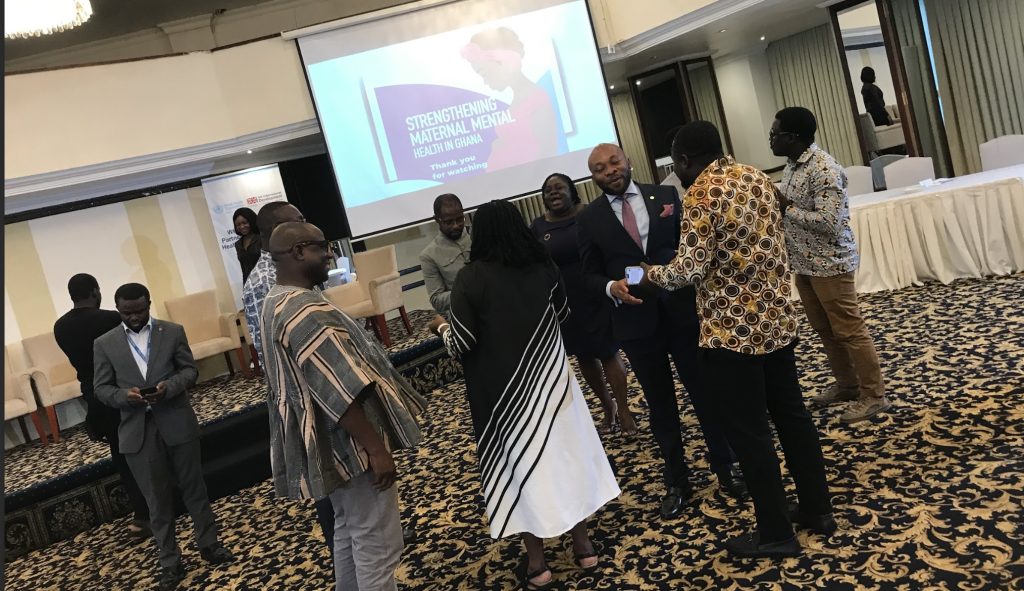BasicNeeds-Ghana, with all humility, prides itself as the trailblazer of maternal mental health matters in Ghana. With its pioneering ‘New Initiatives in Mental Health and Development in Ghana’ in 2002, mental health issues of women and young people became prominent in no time as we went round raising awareness and facilitating treatment for people living with mental health care needs.
It is therefore very gratifying that a structured effort to fully understand the various dimensions of mental health on women, as individuals, mothers and wives, and or heads of households and families has been completed. The anxiety and stress to conceive, through to pregnancy, labour and delivery exacerbate the emotional and general wellbeing of women and girls. Pre-menstrual, menstrual, and menopausal periods cause women to become scared, feel sad and or not in control. Depression affect mother and child, and families, many times, manifesting in pre-term birth, poor growth, and cognitive development
Having participated in aspects of the field level consultations and data collection of the situational analysis, whose report is about to be launched today, I can vouch that this report represents the real issues and lived experiences of women and girls, caregivers and families, and health services providers as well as those of stakeholders who care about the health and wellbeing of women, neonates, infants, and children in Ghana and widely.
BasicNeeds-Ghana is full of appreciation to the UKaid FCDO for believing in us and being the first to fund our initiative in 2015 to contribute to strengthening community health services to improve gender, women, and youth mental health. Through that funding, BasicNeeds-Ghana worked with the Ghana Health Service, and Ghana Mental Health Authority and a host of partner NGOs/CBOs on mental health of vulnerable pregnant women and girls, and postpartum mothers. The initiative led to the introduction of a validated screening tool for assessing depression among pregnant women and postpartum mothers. Along with training which was supported by a group of volunteer nurses and midwives from the UK and Ghanaian psychiatrists and midwives, a 1200 midwives, Community Health Nurses, and Community Psychiatric Nurses and Community Mental Health Officers in 48 districts were trained on administering the Edinburg Perinatal Depression Scale (EPDS). The beneficiary target Maternal and Child Health and Welfare Clinics were supported to consciously screen pregnant women and newly delivered mothers who come to their clinics and appropriately refer for attention after providing normal talking therapy. They were to also encourage pregnant women and postpartum mothers to complete four ANC visits, deliver at health facilities and have their children fully immunised.
There was enthusiasm and the screening tool was embraced. The trained personnel were upbeat, just as most of the district directors and in-charges of health facilities were. There was resounding agreement that maternal and child health and welfare can be enhanced by consciously including the Mental Health and Psychosocial Support Service (MHPSS) aspects among pregnant women and postpartum mothers.
As it is with projects, when the financial cushioning that the initiative provided ended the rate of screening and referrals dwindled. Many of the trained healthcare personnel progressed and moved on and or even retired and with no continuation of the training the numbers skilled and competent to provide the services drastically reduced.
The all-familiar lesson of this pilot was that, despite the success of it, its sustainability laid squarely on expressed policy enshrining MHPSS in national maternal and child health and welfare services and practices. Integrating MHPSS makes it mandatory and inclusive for all pregnant women and girls and post-partum mothers to be screened. It will make it obligatory for the health worker and or social worker to screen, provide the first line of assistance and refer appropriately. Maternal and child health outcomes will surely increase. Population mental health will be enhanced too. We in BasicNeeds-Ghana are excited and look forward to a continued working relationship with the GHS, MHA, the WHO and UKaid FCDO to make


